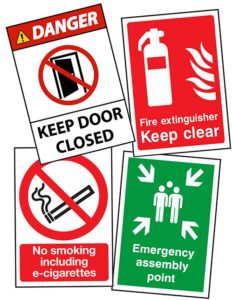Several reports of fires in hotels have made headlines in recent months, including an incident in Scotland where three people lost their lives in January. The challenges of ensuring fire safe procedures are only growing, though. Hotels being used as ‘contingency’ housing measures by the Home Office for asylum seekers are creating new, unpredictable elements for risk assessors and fire & rescue services to factor in, with inclusive evacuation scenario planning imperative to ensure the protection of residents.
In an exclusive report, Hunter Seymour examines the issue, noting the requirements to ‘prepare for the unpredictable’ and ensuring vulnerable residents can be alerted in the event of a fire.

Meanwhile, this comes against a backdrop of recent statistics which reveal that Accidental Fires and Deliberate Fires in UK Hotels have risen by 20% in the last recorded year (2021-2022) and there have been more fire-related fatalities, in incidents overall, than the previous reported year. There were three hotel fatalities in the first week of this New Year alone.
Such critical concerns also refer to associated safety issues affecting any disadvantaged newcomer to hotels, such as language and cultural barriers, child safeguarding, mental health, and physical and sensory impairments. All of these carry significant implications for fire safety measures, which we examine here.
“Change of Use” anomaly
The Home Office, having subcontracted provision of hotels for the government’s “Asylum Estate” to third party property management companies, states: “Our accommodation providers are contractually obliged to provide adequate accommodation and to conduct regular quality assurance checks across the asylum estate.”
In reality, as in the case of six requisitioned hotels in a major English seaside resort on the South Coast, our enquiries reveal that consultation with local authority planning does not necessarily occur.
Contravention on the South Coast
In this case, the Leader of the South Coast resort’s Borough Council states:
“Neither the Home Office nor their property management contractor consulted with us in advance of the placements. In respect of [Regulatory Reform (Fire Safety) Order] compliance, the establishments would be registered as hotels and would therefore conform with planning legislation and, in that context, the Fire Authority would have issued fire certificates.”
This results in the seemingly anomalous outcome of a “Change of Use” (from “hotel to hostel”, within the terms defined by RRFSO Guidance on “Sleeping Accommodation”); a change facilitated by the Fire & Rescue Service’s acceptance of the subcontractor’s assurance that they “have chosen to take block bookings”, thus alluding to the “asylum estate” as a group of “service users” composed of regular hotel guests, with customary needs.
These assumptions are far from the reality of the case – a Home Office report in January revealed that 200 unaccompanied asylum-seeking children have gone missing from hotels run by the Government.
These misgivings, arising from hotels transitioning into hostels without due diligence, are highlighted by a recent case, in Great Yarmouth, that led a High Court Judge to grant an ongoing injunction to prevent hotels under Home Office contracts in the town being used to house asylum seekers due to planning contraventions. This legal precedent is expected be cited in other cases of breaches of local authority planning control.
Disadvantaged hotel arrivals
In response to this interpretation of RRFSO compliance and its questionable circumvention, in the case of the six requisitioned hotels in the South Coast, the Local Authority’s Fire Service comments:
“We have worked closely with the hotels [contracted for asylum seekers] to ensure that the Responsible Person (RP) has considered the additional time people may spend in the rooms compared to a typical guest, appropriate briefings on arrival, and signage and fire instruction information being provided in a range of languages.
“Additionally, we have taken a pro-active approach to helping support those living in this accommodation, working alongside other agencies and organisations and with the assistance of interpreters. For example, we visit hotels to speak to unaccompanied children who are seeking asylum, helping educate them about water and beach safety, and road and fire hazards. We are developing a similar process for the adult and family hotels, again in a voluntary capacity [i.e. supplying extra support]. Part of this work includes the development of pictogram safety messages to try to negate the need for interpreters.”
Hazards of language barriers
Primarily, Borders and Immigration inspectors are the investigative service that reports on how contingency asylum accommodation providers deliver accommodation in line with the AASC (Asylum Accommodation and Support Contracts), with particular reference to safeguarding.

- Smoke alarm tampering: In one hotel bedroom a smoke alarm had been covered with a face-mask, by the previous service user who smoked, to prevent it from setting off the alarm. The current occupant of the room told inspectors that they did not smoke, and inspectors noted that the room did not smell of cigarettes. The housing manager told the inspectors that the smoke alarms were checked whenever a new service user moved into a room. This led inspectors to question both the frequency and thoroughness of the service provider’s checks.
- Cooking in rooms: The Report highlights the difficulties of meeting the dietary needs of some asylum seekers and, in consequence – culturally – the inappropriateness and poor provision of food for children.
These fears are borne out by recent press accounts of accommodation centres in which smoke alarms have been covered up where occupants had been found to be cooking in their rooms. An investigation found that, in breach of management rules, asylum seekers were blocking fire escapes so they could secretly cook for themselves in their bedrooms with hidden cooking equipment – including hot plates and gas cylinders. More than 100 people, including refugee families staying at the hostel at the time, were exposed to this life-threatening fire hazard.
In another refugee accommodation centre a fire was allegedly caused by a tea light used to heat food.
Late last year it was reported that there are more than 37,000 asylum seekers in UK hotels. The safety issues for Local Authority regulators is further complicated by the challenges confronting them when assessing whether the hotels and hostels used to house asylum seekers are HMOs (Houses in Multiple Occupation) or whether they are subject to other regulatory oversight. These continuing challenges heighten health and safety concerns and underline the need for effective regulation.
These concerns are compounded by news this year of hundreds of elderly patients being moved out of hospitals into hotel rooms to help the NHS cope with the bed-blocking crisis.
Preparing for the unpredictable
The causes of hotel fires are often difficult to predict. Only last year, the Fire Industry Association reported a hotel fire was caused by a guest bringing an electric bike (without the hotel’s consent) into their bedroom and putting it on charge using an imported replacement charger. In consequence, the batteries overheated, resulting in the fire.
Thanks to ensuring correct maintenance standards, the hotel’s fire detection and fire alarm system activated correctly, alerting staff and guests to the fire. Clearly, a breach of safeguarding such as this, in a communal setting, reminds us of the serious consequences for all occupants when there is any lapse of vigilance.
In the case of disadvantaged hotel guests – restricted by language barriers, infirmities of age, or sensory or physical impairments – the risks of harm in a fire incident have the potential to multiply significantly, with disorientation a common factor.
Risk assessments, therefore, should account for an equality of inclusivity when considering evacuation scenarios and strategies for the safety of more vulnerable hotel users in the event of fire.
Alerting vulnerable hotel occupants
For example, the UK charity, Action on Hearing Loss, argues that many hotels put the lives of visitors with hearing loss at risk by not having appropriate alert procedures in place for emergency situations. The UK has a growing deaf community of nine million people, approximately 18% of the total population.
One shocking incident that befell a hotel guest, reported by a profoundly deaf young woman, powerfully illustrates the sense of alienation and defenselessness for those with a hearing impairment when awakened to the sounding of an alert they cannot hear. She was asleep in her hotel room when a stranger entered her door and approached her bed. She could barely express her horror at being woken up by an unknown man’s hand on her shoulder for her requested wake-up call. He was a staff member, but the experience of the unwanted and unexpected physical contact was a “truly awful” experience.

Louise Halvey uses an Agrippa pillow alarm when travelling
Greater sensitivity, then, is the watchword for all hotel owners and staff to ensure the needs of all visitors with vulnerabilites are met. Hoteliers should review their safety measures to achieve ease of accessibility for all customers. Foremost, for the deaf and hard of hearing, is provision of flashing fire alarms, alarms with vibrating pads to be placed beneath pillows, and a loop system at counter areas and reception desks that enable communication with hearing-aid users.
Without limits
TV’s Louise Halvey (BBC 1 Without Limits), a swimming teacher, has a progressive hearing loss, which is now severe to profound. She travels regularly with her Agrippa pillow fire alarm, as she stays in a number of hotels, when teaching deaf children to swim. The device extends her freedom. “It allows deaf guests like myself to sleep with our minds put at ease.”
Louise has noticed that many hotels have little or no provision to meet the needs of their deaf guests which puts her and others in potential danger. Agrippa’s pillow fire alarm is a low-cost, battery powered, wire-free bedside unit with a vibrating pad that sits under the sleeper’s pillow, which is activated when the fire alarm sounds. Along with the vibrating pillow pad the unit has bright LEDs, which flash and an LCD screen that clearly displays the word “FIRE”.

